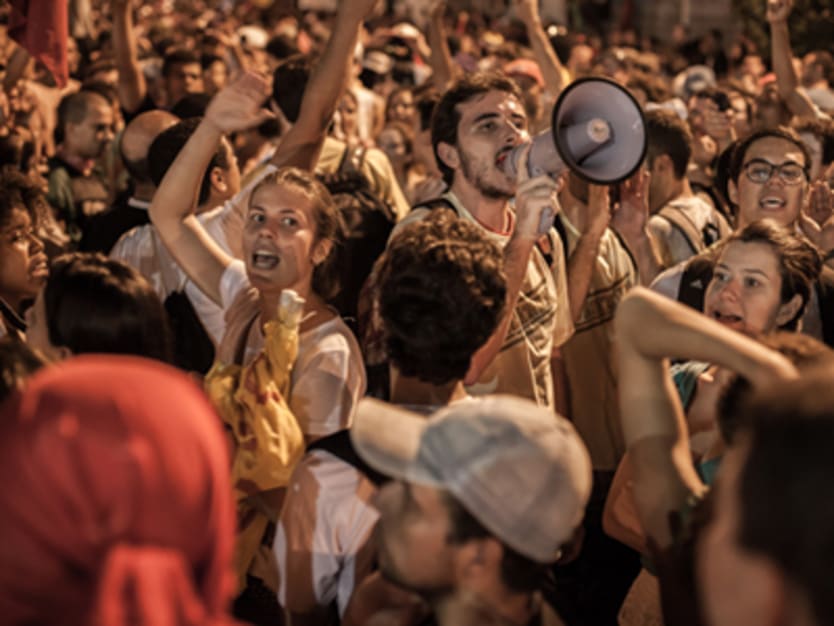
Young people are creating a movement for social change. They are brimming with energy waiting to be transformed into positive social action. Are we paying attention to what they have to say and supporting what they want to achieve?
During my long career focused on children and youth, I’ve seen firsthand young people taking action on issues that concern them. My work has exposed me to youth from different cultural, religious and a wide variety of socio-economic backgrounds. Many are living in vulnerable environments due to poverty and inequality, violence, conflict or climate change. Others come from affluent and stable societies and have access to an array of services. Despite these differences, they all share the same burning concern — “People don’t care what young people think, what we see and what we want to change” is how a young woman from Armenia recently expressed it to me.
In my interactions with young people, what has impressed me most is their ability to grasp the reality they are living in. I’ve been moved by their desire to get involved and engage in decisions and actions that affect their lives, and the lives of those around them. They are standing their ground against social injustice and discrimination.
One among many examples is a network representing 120,000 young people in Latin America mobilizing to improve health in their communities. In a written declaration to governments and organizations gathered at the World Conference on Social Determinants of Health in Rio de Janeiro on 2012, they said:
“We wish to reiterate that we are an underrepresented group. Although we are aware of our responsibilities for our own health and we want to participate in making decisions concerning us, we are also a considerable social force that wishes to be taken into account to reduce inequities in our region. We have experience in community development aimed at reducing poverty and promoting new alternatives for development. We offer our commitment and we demand access to information and to take part in capacity building strategies implemented at the national, sub-regional, and regional level.”
Much like young people from previous generations, they want to shake up the status quo. But there is something different about the young people of our time. Is it that they have unprecedented access to information, increasing their exposure to diverse systems and values? Is it that they are more aware of their rights? Is it that the Internet and social media offer the possibility to be generators of opinion? Probably it’s is a combination of all these factors. The truth of the matter is that youth want their voices to be heard and to be taken into account. They won’t settle for theories or unfulfilled promises. They are demanding a space at the decision making table and they want action.
Today we commemorate International Youth Day. This year’s theme is “Youth Migration: Moving Development Forward.” Never has the time been more ripe for partnering with young people to shift the boundaries on how we do development. New partnerships on migration and other issues should be intergenerational to include children and youth so no one is left behind based on age. This is an excellent opportunity to take stock of how much governments and organizations concerned with development are effectively working with young people. Attitudes towards the emergent generation are changing and new opportunities are opening up for their participation.
But more needs to be done to truly embrace young people as advocates and competent partners in development. This will require a shift in prevailing perceptions across all cultures, that young people are incapable of addressing personal and societal needs, or that they are passive recipients of programs and services.
The era of disempowerment is over. The responsibility for equal and sustainable development should be shared across generations. Malala Yousafzai, a 16-year-old from Pakistan, recently proclaimed in her speech at the United Nations General Assembly:
“We will continue our journey to our destination of peace and education for everyone. No one can stop us. We will speak for our rights and we will bring change through our voice. We must believe in the power and the strength of our words. Our words can change the world.”
When you next talk to a young person about issues of social progress, you will hear them speak with an idealism grounded in reality. Listening and engaging with young people in strategic and intergenerational partnerships is absolutely necessary for equitable and sustainable development. The youth embody the generation with the greatest potential; let’s work with them to develop the tools to become an even better and positive social force for change. Join the youth-led revolution.
Join the Devex communityand gain access to more in-depth analysis, breaking news and business advice — and a host of other services — on international development, humanitarian aid and global health.
Read more:








